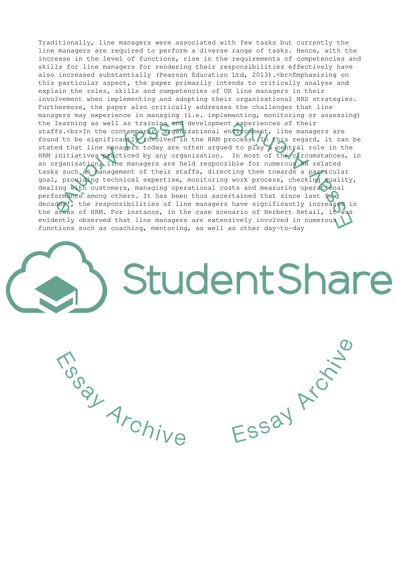Cite this document
(Analyse and explain the role, skills and competencies of UK line Essay, n.d.)
Analyse and explain the role, skills and competencies of UK line Essay. https://studentshare.org/human-resources/1795846-analyse-and-explain-the-role-skills-and-competencies-of-uk-line-managers-in-their-involvement-in-implementing-and-adopting-their-organisations-hrd-strategy-identify-some-of-the-key-challenges-that-line-managers-may-experience-in-managing-ie-impleme
Analyse and explain the role, skills and competencies of UK line Essay. https://studentshare.org/human-resources/1795846-analyse-and-explain-the-role-skills-and-competencies-of-uk-line-managers-in-their-involvement-in-implementing-and-adopting-their-organisations-hrd-strategy-identify-some-of-the-key-challenges-that-line-managers-may-experience-in-managing-ie-impleme
(Analyse and Explain the Role, Skills and Competencies of UK Line Essay)
Analyse and Explain the Role, Skills and Competencies of UK Line Essay. https://studentshare.org/human-resources/1795846-analyse-and-explain-the-role-skills-and-competencies-of-uk-line-managers-in-their-involvement-in-implementing-and-adopting-their-organisations-hrd-strategy-identify-some-of-the-key-challenges-that-line-managers-may-experience-in-managing-ie-impleme.
Analyse and Explain the Role, Skills and Competencies of UK Line Essay. https://studentshare.org/human-resources/1795846-analyse-and-explain-the-role-skills-and-competencies-of-uk-line-managers-in-their-involvement-in-implementing-and-adopting-their-organisations-hrd-strategy-identify-some-of-the-key-challenges-that-line-managers-may-experience-in-managing-ie-impleme.
“Analyse and Explain the Role, Skills and Competencies of UK Line Essay”. https://studentshare.org/human-resources/1795846-analyse-and-explain-the-role-skills-and-competencies-of-uk-line-managers-in-their-involvement-in-implementing-and-adopting-their-organisations-hrd-strategy-identify-some-of-the-key-challenges-that-line-managers-may-experience-in-managing-ie-impleme.


